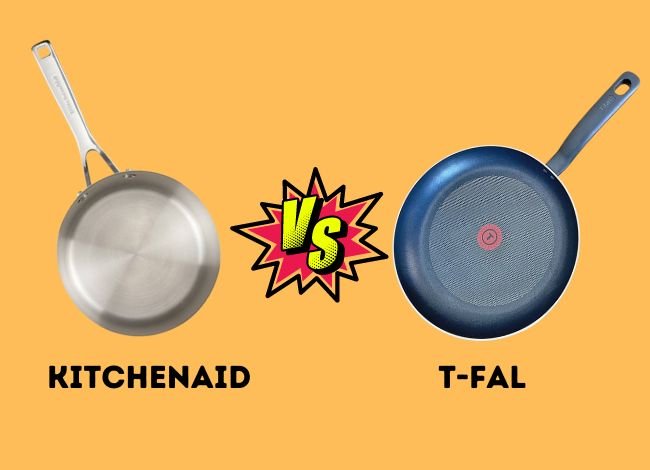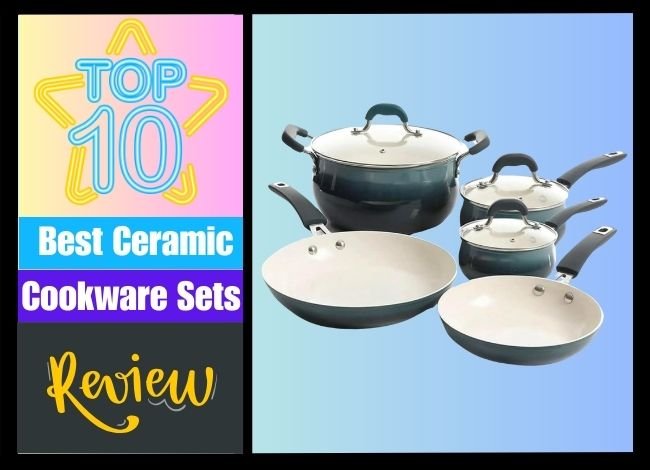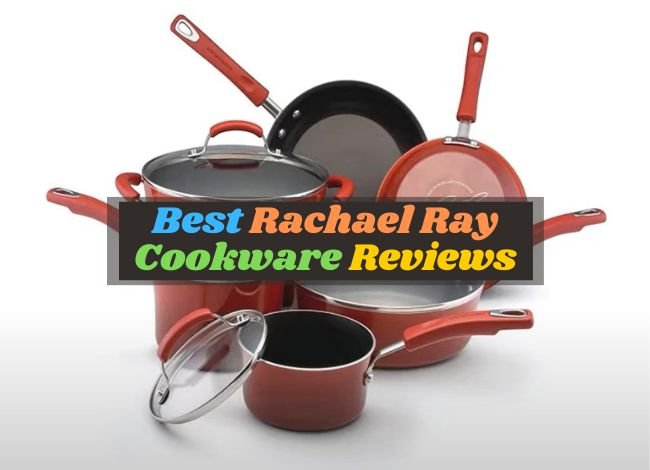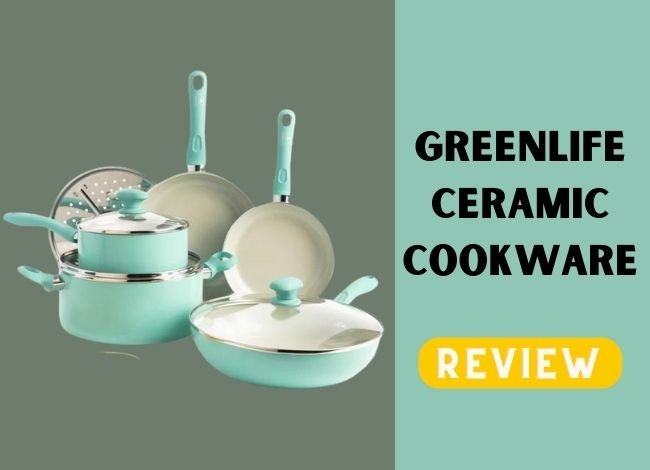Last Updated on January 18, 2024
When it comes to cookware, both quality and performance are critical factors to consider. With a plethora of options available, it can be challenging to determine which brand suits your needs best. In this article, we’ll compare two popular cookware brands, T-fal and KitchenAid, examining their features, pros, and cons. Finally, we’ll declare a winner to help you make an informed decision.
Comparison Table:
| Feature | T-fal | KitchenAid |
|---|---|---|
| Material | Aluminum, Non-stick coating | Stainless steel, Non-stick, Ceramic |
| Number of Pieces | Varies by set (12-18 pieces) | Varies by set (10-14 pieces) |
| Heat Distribution | Even heat distribution | Even heat distribution |
| Oven Safe | Up to 350°F (175°C) | Up to 500°F (260°C) |
| Dishwasher Safe | Yes | Yes |
| Induction Compatibility | Limited to specific sets | Stainless steel sets compatible |
| Price Range | $70 – $200 | $100 – $400 |
| Warranty | Limited Lifetime Warranty | Limited Lifetime Warranty |
Features
T-fal
T-fal cookware sets are known for their durability and even heat distribution, thanks to their aluminum construction and non-stick coating. They are easy to clean and maintain, and many sets include a Thermo-Spot heat indicator that shows when the pan has reached the optimal cooking temperature. T-fal cookware is dishwasher safe and oven safe up to 350°F (175°C). Some T-fal sets are compatible with induction cooktops.
- Specialty: Known primarily for its non-stick cookware.
- Material: Typically made of aluminum with a non-stick coating. Some models also have a stainless steel base for induction compatibility.
- Unique Feature: Many T-fal pans have the Thermo-Spot indicator that signals when the pan is perfectly preheated.
- Price: Generally more budget-friendly compared to high-end cookware brands.
- Maintenance: Non-stick surface makes it easy to clean. Hand washing is recommended for a longer lifespan, even if some models are dishwasher safe.
- Best For: Everyday cooking, especially dishes that benefit from a non-stick surface like eggs and pancakes.
KitchenAid
KitchenAid offers a variety of cookware sets, including stainless steel, non-stick, and ceramic options. They are known for their high-quality construction, providing even heat distribution and durability. KitchenAid cookware is dishwasher safe and oven safe up to 500°F (260°C), allowing for versatile cooking techniques. Stainless steel sets are compatible with induction cooktops, while non-stick and ceramic sets are not.
- Specialty: Offers a broader range of cookware types, including stainless steel, non-stick, and hard-anodized.
- Material: Quality varies, ranging from aluminum to stainless steel. Many of their premium lines feature a multi-layer construction for even heating.
- Unique Feature: Some KitchenAid lines offer a copper core for enhanced heat conductivity.
- Price: A wide range, with some lines being premium and costing more. You pay for the durability and performance.
- Maintenance: Depends on the type. Stainless steel may require more effort to clean compared to non-stick. However, many of their products are dishwasher safe.
- Best For: Versatile cooking needs, from searing and braising in stainless steel pans to easy cooking on non-stick surfaces.
Winner
When it comes to overall features, KitchenAid takes the lead due to its diverse cookware options, higher oven-safe temperature, and induction compatibility for stainless steel sets.
Which should you buy?
- Budget Concerns: If you’re on a tight budget, T-fal might be the better option for you.
- Cooking Needs: If you want non-stick pans specifically for dishes like eggs, T-fal is a solid choice. If you’re looking for a more versatile range, especially for techniques like searing, KitchenAid’s stainless steel options might be more appealing.
- Durability: KitchenAid’s premium lines tend to be more durable and are built for long-term performance.
- Aesthetics: If you prefer a particular look or design, this can influence your decision. KitchenAid often offers more “premium” looking designs.
Conclusion
Both T-fal and KitchenAid cookware sets offer excellent performance, even heat distribution, and easy maintenance. If you’re looking for a more budget-friendly option with unique features like the Thermo-Spot heat indicator, T-fal is a solid choice. However, KitchenAid is better if you’re willing to invest in higher-quality materials and more versatile cookware options.
Ultimately, the choice between T-fal and KitchenAid cookware will come down to your personal preferences and kitchen needs. Both brands offer a range of sets to suit your requirements and budget, so you’re sure to find the perfect cookware set for your kitchen.
Frequently Asked Questions
Q: Is T-fal cookware oven-safe?
A: Most T-fal cookware is oven-safe, but the maximum temperature tolerance varies by line. It’s important to check the specific product details for the exact temperature rating.
Q: Can KitchenAid cookware be used on induction cooktops?
A: Many KitchenAid cookware collections are induction-compatible, but it’s essential to verify the specifications of the individual product line.
Q: How does the durability of T-fal compare to KitchenAid?
A: KitchenAid cookware generally offers greater durability, especially in their stainless steel and cast iron ranges, compared to the more budget-friendly T-fal non-stick lines.
Q: Are there any special care instructions for T-fal non-stick cookware?
A: T-fal non-stick cookware should be cleaned with non-abrasive cleaners and sponges. It’s also recommended to avoid high heat and metal utensils to preserve the non-stick surface.
Q: Does KitchenAid offer non-stick cookware options?
A: Yes, KitchenAid provides non-stick cookware lines that are often more expensive than T-fal but offer additional features like thicker gauge construction and superior heat distribution.
Q: What warranties do T-fal and KitchenAid offer on their cookware?
A: T-fal offers a limited lifetime warranty on most of its cookware, while KitchenAid also offers a limited lifetime warranty, but terms and coverage may vary between products.
Q: Are T-fal and KitchenAid cookware dishwasher safe?
A: Many T-fal and KitchenAid cookware products are dishwasher safe, but it’s recommended to check specific product guidelines as certain lines may require hand washing.
Q: Can I use metal utensils with KitchenAid cookware?
A: It depends on the specific line of KitchenAid cookware. Stainless steel and cast iron lines can generally withstand metal utensils, but non-stick lines should avoid metal to prevent surface damage.
Q: How do T-fal and KitchenAid cookware perform in terms of heat distribution?
A: KitchenAid cookware, particularly their stainless steel and cast iron products, typically offer superior heat distribution compared to T-fal’s budget-friendly non-stick lines.
Q: What types of coatings are used in T-fal and KitchenAid non-stick cookware?
A: T-fal uses its proprietary non-stick coatings like Titanium Pro, while KitchenAid non-stick cookware often features layers of reinforced non-stick coating for enhanced durability.
Q: Is T-fal a good option for budget-conscious shoppers?
A: Yes, T-fal is an excellent option for those who want quality non-stick cookware at a more affordable price point, though it might lack some of the advanced features of higher-end brands like KitchenAid.




